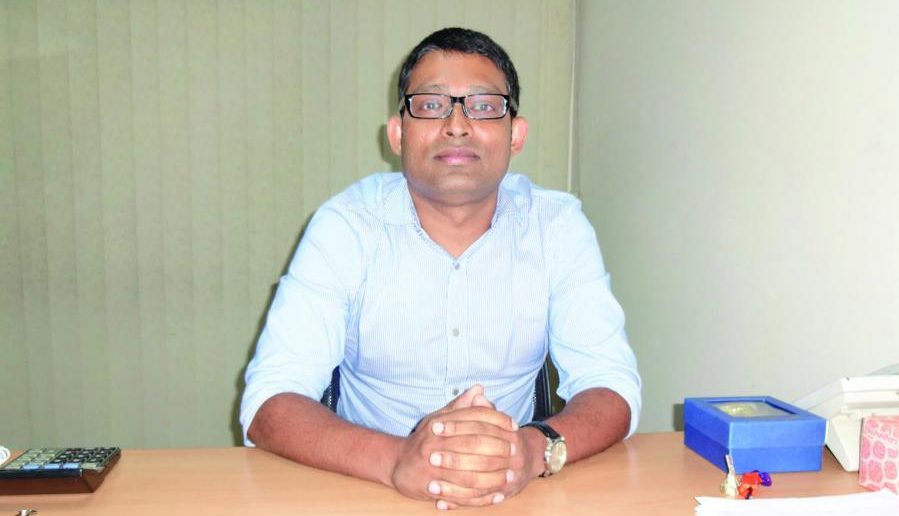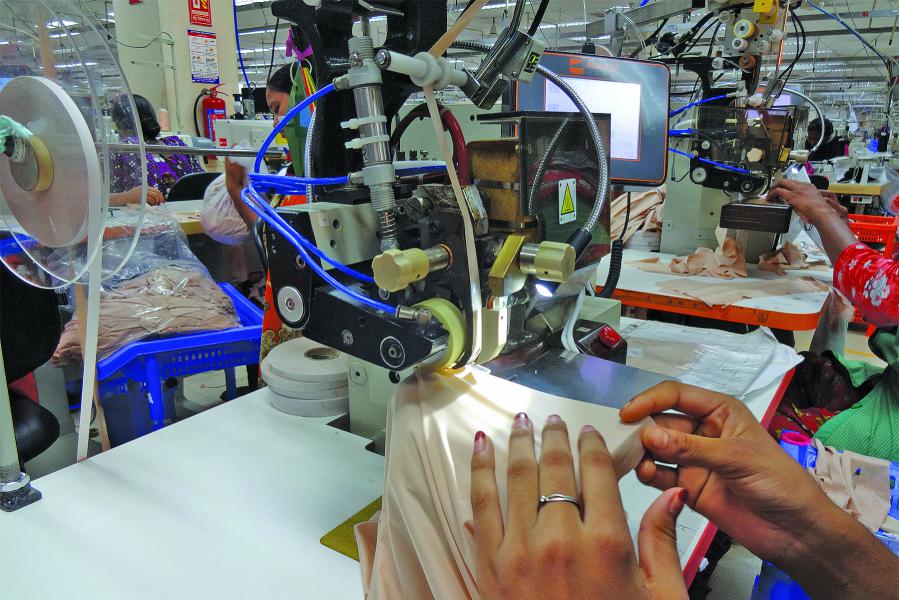
There has been a lot of talk about the shift of business from China to Bangladesh, after which the factories have started ramping up systems and capacities to manufacture the kind of products expected to find way into the country. Breaking away from this ‘push’ mentality, SQ Group’s lingerie manufacturing division SQ Birichina has for the past few years been creating an ecosystem for lingerie manufacturing, equally competent to any Sri Lankan or Chinese lingerie factory. Established in 2008, the company has grown from 250 sewing machines to 2000 machines. Spearheading the lingerie division since its inception, Senthil Selvan, Director Operations, SQ Birichina has been instrumental in developing a manufacturing setup equipped with the right combination of automation, skilled workforce and production systems.
The advanced automated machines utilized by us require special training before operating the same. So even if we recruit an already trained operator, we would still have to first deskill him/her and then again skill him/her, because they have never handled such machines and processes – Senthil Selvan, Director Operations, SQ Birichina
Lingerie is not new to Bangladesh as the volumes are already present with the country in terms of panties and plus size bras, but the product upgradation in terms of criticality and increased FOBs are yet to be seen by the industry. “2008 was a very difficult time for lingerie exporters in Bangladesh as no one knew about it back then. But since then many volume players have come up in the market with 200+ sewing machines, and that is what prompted us to focus on the products instead of the capacities,” affirms Senthil, who has been with SQ Group for nearly a decade. “For the last three years, we have focused on building capabilities for manufacturing the more luxurious, technically advanced and fashion-driven lingerie products,” avers Senthil, who believes that there is a dearth of such lingerie manufacturers in the world compared to the demand of such products. Today, leading lingerie retailers in UK and Europe consider SQ as a strategic partner in Bangladesh for any complicated lingerie product due to its product knowhow, technology, state-of-the-art manufacturing facilities, design and development capability, and the resourcefulness of its people.
An example of the company’s capabilities is the line of bonded lingerie products done by the company for some of the best UK and European retailers. SQ Birichina also does a range of shapewear and tummy control products, which is an emerging business in the product range for plus sizes. “We have successfully brought some technically advanced products to Bangladesh which were pre-dominantly sourced from Sri Lanka and China for top retailers,” informs Senthil. As of now, SQ Birichina has dedicated bonding lines for lingerie, which is on a rapid expansion due to the demand and success. For this particular product, SQ got the best of the European machinery and highly skilled and experienced technical staff.
The criticality in bonding lies in the machine’s temperature, time and pressure setting, which is done according to the adhesive material being used; else the product will disintegrate after a wash. Bonding all types of fabrics, SQ sources the bonding tapes from the best suppliers of the industry and the extent of bonding differs from product to product. “We have done panties which are completely bonded and we have also done camisoles in which only the straps have been bonded to the bodice,” shares Senthil. Bonding applications range from attaching lace and similar materials to the garments, hemming the edges, finishing edges with adhesive tapes, eliminating elastics used in bra wings, panty waist and leg openings to make a one-piece bra with minimal seams.
Manufacturing bonded or technically advanced lingerie products not only require investment in automatic machines, but also require development of systems and processes distinct from what is followed in a lingerie factory manufacturing basic products. For starters, SQ does not have sewing lines rather it has flexible hybrid modules of 22 sewing machines, which can be further broken down into smaller groups of, let’s say, 7 to 12 sewing machines as per the requirements of a style, based on product, quantity and leadtime. At present, SQ modules are in efficiencies varying from 50% to 90% based on the product complexity and skill level of the operators. To increase skill and efficiency, SQ has strong Industrial Engineering teams and Subject Matter Experts (SMEs) assigned with specific developmental initiatives, as an integral part of the operations. “The modules not only give us the flexibility in terms of manufacturing a wide range of order quantities but also save a lot of manpower required for sorting and packaging products in buyer specified colour combination with a certain number of pieces of each colour, which doesn’t remain constant,” shares Senthil.

With end-line packaging, the concept is to make the operations as lean as possible and to get the best efficiency. “If you want to do end line packing of 5 panties in 5 different colours of a single size, then you would have to feed a sewing line with the three colours and another sewing line with two colours at the same time and synchronize their production in such a manner that the packing operators receives sufficient amount of panties from both the lines to make a complete pack,” adds Senthil. To further strengthen the traceability in lingerie due to number of garments, sizes and complicated packing methods involved, SQ has introduced RFID from cut to pack to capture live data and simplify the process. SQ, using the latest Gerber Z3 cutter, is also planning to combine cutting with the sewing modules which is presently centralized.

Having set its sight on manufacturing a wide array of lingerie products, multiskilling its sewing operators is very pivotal for SQ Group to achieve the desired goal. The company prefers to recruit fresh operators because of their trainability, which is very low in sewing operators who have already worked in other lingerie factories. “The advanced automated machines utilized by us require special training before operating the same. So even if we recruit an already trained operator, we would still have to first deskill him/her and then again skill him/her, because they have never handled such machines and processes,” points out Senthil, who believes that training fresh people takes less time than retraining experienced operators – a belief necessary for transforming the company into a people-centred and innovationdriven workplace.






